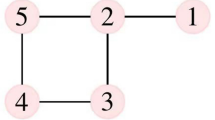Abstract
This paper demonstrates that the method of T–S fuzzy model can be used to describe the uncertain topological structure for high-order linearly parameterized multi-agent systems (MAS). The dynamic of the leader is only available to a portion of the follower agents; thus, we present a novel distributed adaptive iterative learning control (AILC) protocol without using any global information to deal with the consensus problem of MAS under initial-state learning condition. It is proved that the proposed control protocol ensures all the internal signals in the multi-agent system are bounded, and the follower agents track the leader exactly on the finite time interval [0, T]; a sufficient condition is obtained for the exactly consensus result of the multi-agent system by choosing the appropriate composite energy function. Extensions to the formation control of multi-agent systems are also given. In the end, illustrative examples are shown to verify the availability of the proposed AILC scheme.








Similar content being viewed by others
References
Ahn H-S, Chen YQ (2009) Iterative learning control for multi-agent formation. In: Iccas-Sice. IEEE, pp 3111–3116
Ahn H-S, Moore KL, Chen Y (2010) Trajectory-keeping in satellite formation flying via robust periodic learning control. Int J Robust Nonlinear Control 20(14):1655–1666
Chen J, Cao X, Cheng P, Xiao Y, Sun Y (2010) Distributed collaborative control for industrial automation with wireless sensor and actuator networks. IEEE Trans Ind Electron 57(12):4219–4230
Ho D, Li JM, Niu YG (2005) Adaptive neural control for a class of nonlinearly parametric time-delay systems. IEEE Trans Neural Netw Learn Syst 16(3):625–635
Jin X (2016) Adaptive iterative learning control for high-order nonlinear multi-agent systems consensus tracking. Syst Control Lett 89:16–23
Li J, Li J (2013) Adaptive iterative learning control for consensus of multi-agent systems. IET Control Theory Appl 7(1):136–142
Li J, Li J (2014) Adaptive iterative learning control for coordination of second-order multi-agent systems. Int J Robust Nonlinear Control 24(18):3282–3299
Li J, Li J (2016) Distributed adaptive fuzzy iterative learning control of coordination problems for higher order multi-agent systems. Int J Syst Sci 47(10):2318–2329
Lin H, Wei Q, Liu D et al (2016) Adaptive tracking control of leader-following linear multi-agent systems with external disturbances. Int J Syst Sci 47(13):3167–3179
Liu Y, Jia Y (2012) Robust formation control of discrete-time multi-agent systems by iterative learning approach. Int J Control Autom Syst 10(5):913–919
Meng D, Jia Y (2012) Formation control for multi-agent systems through an iterative learning design approach. Int J Robust Nonlinear Control 24(2):340–361
Meng D, Jia Y, Du J et al (2013) Consensus control for directed networks with multiple higher-order discrete dynamic agents: an ILC-based approach. Decis Control IEEE 23(1):4666–4671
Meng D, Jia Y, Du J et al (2014) On iterative learning algorithms for the formation control of nonlinear multi-agent systems. Automatica 50(1):291–295
Qu Z, Wang J, Hull RA (2008) Cooperative control of dynamical systems with application to autonomous vehicles. IEEE Trans Autom Control 53(4):894–911
Ren W (2007) Consensus strategies for cooperative control of vehicle formations. IET Control Theory Appl 1(2):505–512
Ren W, Beard RW (2008) Distributed consensus in multvehicle cooperative control. Commun Control Eng 27(2):71–82
Shahvali M, Shojaei K (2016) Distributed adaptive neural control of nonlinear multi-agent systems with unknown control directions. Nonlinear Dyn 83(4):2213–2228
Shi J, He X, Wang Z et al (2013) Consensus control for a class of second-order multi-agent systems: an iterative learning approach. In: International conference on unmanned aircraft systems. IEEE, pp 841–849
Shi J, He X, Wang Z et al (2014) Iterative consensus for a class of second-order multi-agent systems. J Intell Robot Syst 73(1–4):655–664
Sun MX (2009) A Barbalat-like lemma with its application to learning control. IEEE Trans Autom Control 54(9):2222–2225
Takagi T, Sugeno M (1993) Fuzzy identification of systems and its applications to modeling and control. Read Fuzzy Sets Intell Syst 15(1):387–403
Wang J, Duan Z, Wen G (2015) Distributed H \(\infty \) robust control of uncertain linear multi-agent systems. Int J Robust Nonlinear Control 25(13):2162–2179
Xiong WJ, Yu W, Lu JH, Yu XH (2014) Fuzzy modelling and consensus of nonlinear multiagent systems with variable structure. IEEE Trans Circuits Syst I Regul Pap 61(4):1183–1191
Xiong W, Xu L, Huang T et al (2017a) Finite-Iteration tracking of singular coupled systems based on learning control with packet losses. IEEE Trans Syst Man Cybern Syst 99:1–11
Xiong W, Xu L, Ho D et al (2017b) Synchronous and asynchronous iterative learning strategies of T–S fuzzy systems with measurable and unmeasurable state information. IEEE Trans Fuzzy Syst PP(99): 1–1
Yang S, Xu JX (2012) Adaptive iterative learning control for multi-agent systems consensus tracking. IEEE Int Conf Syst Man Cybernet 8350(2):4672–4677
Yang S, Xu JX, Yu M (2013) An iterative learning control approach for synchronization of multi-agent systems under iteration-varying graph. Decision and Control. IEEE, pp 6682–6687
Yang S, Xu J, Huang D et al (2015) Synchronization of heterogeneous multi-agent systems by adaptive iterative learning control. Asian J Control 17(6):2091–2104
Yu W, Chen G, Lü J (2012) Pinning control of general multi-agent systems. In: Intelligent control and automation. IEEE, pp 1930–1935
Zhang HW, Lewis FL (2012) Adaptive cooperative tracking control of higher-order nonlinear systems with unknown dynamics. Automatica 48(7):1432–1439
Acknowledgements
This study was funded by the National Nature Science Foundation of China under Grant 61573013, 61603286.
Author information
Authors and Affiliations
Corresponding author
Ethics declarations
Conflict of interest
The authors declare that they have no conflict of interest.
Ethical approval
This article does not contain any studies with human participants or animals performed by any of the authors.
Informed consent
Informed consent was obtained from all individual participants included in the study.
Additional information
Communicated by V. Loia.
Publisher's Note
Springer Nature remains neutral with regard to jurisdictional claims in published maps and institutional affiliations.
Rights and permissions
About this article
Cite this article
Wu, H., Li, J. Coordination control of uncertain topological high-order multi-agent systems: distributed fuzzy adaptive iterative learning approach. Soft Comput 23, 6183–6196 (2019). https://doi.org/10.1007/s00500-018-3271-1
Published:
Issue Date:
DOI: https://doi.org/10.1007/s00500-018-3271-1




